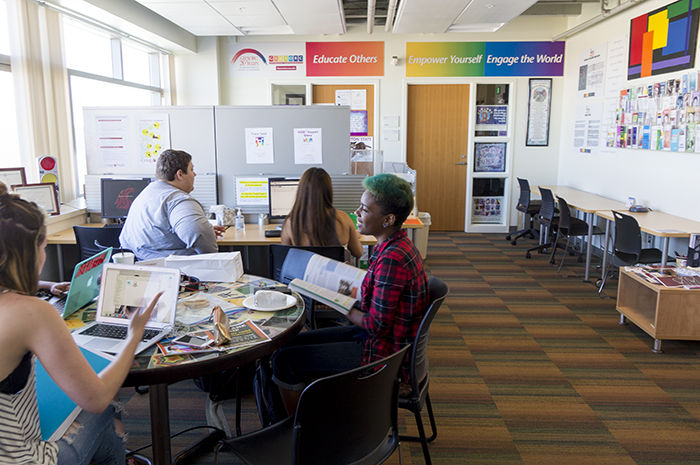Preserving the sanctity of safe spaces on college campuses
Safe spaces are about allowing students to freely express themselves without judgment, not censoring student’s language.
September 30, 2016
Safe spaces. I’ll give some readers time to shudder and recover after reading those two words.
Now, let’s begin some major debunking. The divisive dialogue over safe spaces is raging all over the English-speaking world, including the United Kingdom.
Tim Squirrell, former president of the Cambridge University Union of Students, weighed into the debate in a 2015 article from The Guardian.
“Safe space gets a bit of a bad rap,” Squirrell told the Guardian. “Most of the people involved in advocating these types of policies don’t mind debate; they just don’t want to do so in their homes with strangers.”
He would by and large be correct — most of us fair-minded university students gladly invite controversy, dialogue and debate. This creates a healthy educational atmosphere and indeed an open and democratic society.
The issue for many people is that they see safe spaces as an attempt to censor their ability to speak however they want.
Let me assure you this is not the case. Safe spaces were and are designed to be places of open dialogue for groups of people who historically feel marginalized in other academic or social settings.
I work in one of these places. It’s called the Gender Identity/Expression and Sexual Orientation Resource Center, GIESORC for short.
In fact, GIESORC is not a completely trigger free zone because we do not believe it should be our express effort to walk on egg shells with how we speak.
However, we don’t go out of our way to use charged language or make assumptions about sexual orientation, gender identity or any other life status, because that is simply the right thing to do.
The reason GIESORC qualifies as a safe space is not for its censorship of language, but because we are a place where people can freely express themselves as non-heterosexual or non-gender conforming individuals without fear of reprisal, judgment or shame.
An out and proud gay man like myself has no problem stating I have a male partner and do not share the experience of a girlfriend. Believe it or not, safe space critics, the learning environment you inhabit and sometimes create, are not always those places. Many individuals do not feel safe expressing themselves in a still hyper-masculine, white and privileged environment like WSU.
Guardian columnist Timothy Garton Ash described our current dilemma well when he wrote, “In fact, one under examined question is precisely this: what kind of space is a university? And the answer, which also explains some of the confusion, must be: several different kinds of space, which should have different standards.”
Melynda Huskey, Interim Vice President of Student Affairs and the Dean of Students, believes every university needs a balance of three different types of safe spaces regarding learning, development and expression.
“Everyone should have some safe spaces. We all need places where we are affirmed and comfortable, where we don’t have to explain or defend ourselves or fear that we will be harmed,” Huskey wrote in an email. “Because college campuses are also sometimes students’ homes, there should be places on every campus where students find that safety.”
Concerning the two other types of spaces, Huskey wrote there should be spaces for free debate but also so-called “brave spaces” for engagement with new and potentially difficult ideas.
“We also have a constitutionally-guaranteed right of freedom of expression. That’s one of the core values of our institution, and we take it very seriously. Every student has the right to express their ideas freely, popular or unpopular, well-thought-out or silly,” Huskey wrote.
“And then there’s a third space, one that I believe is absolutely invaluable in higher education. Everyone should have some spaces to engage deeply with difficult ideas, with strange new possibilities, and take risks, and fail, and try to do better next time.”
For example, not every 50-minute lecture needs to have introductions and inquiries into preferred gender pronouns. A professor and student’s time are equally precious, so these sorts of exercises likely go against the teaching goals of the average lecture.
However, we should not intentionally look to offend, drum up unnecessary controversy, or fall into the trap of thinking that just because we can say something means that we should.
For example, if you are not a gay man, I do not suggest exercising your right to free speech by saying a certain six letter f-word. For me and many others, university is a bizarre mixture of home and work. In a town as small as Pullman, separating the two is a difficult exercise, meaning I don’t want my small apartment to be the only place I don’t hear bigoted epithets.
If you oppose safe spaces because you find issue with people using these places to learn, build causes and cases that make you uncomfortable, you might consider living in a country without free expression, like North Korea.
On the other hand, if you believe safe spaces should be used to control the dialogue and learning of an entire campus, you do not understand the purpose of safe spaces.
Safe spaces are not tools of the marginalized for the purpose of marginalizing the thoughts of others. You discredit the sanctity of safe spaces by using them to censor others, regardless of how insensitive or ignorant their speech is.
Controversy and consequent conversation should always be hallmarks of the college experience.
Tyler Laferriere is a graduate student pursuing his master’s in economics from Phoenix, Arizona. He can be contacted at 335-2290 or by [email protected]. The opinions expressed in this column are not necessarily those of the staff of The Daily Evergreen or those of The Office of Student Media.



















